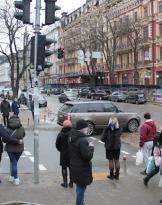We find Spartacus in the workplace, a few hundred yards from the enemy lines. It comes from the Brescia valleys; in the rare cases where it opens its mouth, it is understood immediately. He is a man with more experience than words: for years he has forged with the Italian Armed Forces and missions abroad. Now let's talk about the decorations he has gained in the field.
At Donetsk Airport, during the encirclement of the Iversky Monastery, he was there. For days it remained among the walls of the shrine, surrounded by Ukrainians with temperatures up to -20 °. Wandering in those memories is a blow. The wounds suffered, the fallen companions, the frost, the five dishes used to eat in turn from a platoon, the very fear of dying ... everything digs in like a cold knife. Back as a nightmare, above all, the control tower of the gate from which the maximum concentration of enemy fire came.
Remember Spartaco well, remember everything: remember the shells that fell to the ground with an obsessive noise of light metal; recalls the Ukrainian flags on the antennas of the tanks, so close to cover the view of the viewfinder; remember all the times when he thought of his mother and the possibility of not seeing her again.
 Let's go to the monastery with his companion Lom "Lead ball" that describes us in detail the battle. It also shows a pattern on the wall: the crosses mean "enemies killed". Still on the ground, bombs, antigas masks, open food boxes, and then rubble, rubble, rubble everywhere ... The fine word put it on the commander's artillery Givi who with his Somali battalion literally submerged Sergei Prokofiev airport under a rain of bombs, bending the resistance of the "Cyborg", Ukrainian soldiers assassinated inside. The hell of those days lives in every fragment, every inch. The war has passed from here and has brought with it an eternal silence.
Let's go to the monastery with his companion Lom "Lead ball" that describes us in detail the battle. It also shows a pattern on the wall: the crosses mean "enemies killed". Still on the ground, bombs, antigas masks, open food boxes, and then rubble, rubble, rubble everywhere ... The fine word put it on the commander's artillery Givi who with his Somali battalion literally submerged Sergei Prokofiev airport under a rain of bombs, bending the resistance of the "Cyborg", Ukrainian soldiers assassinated inside. The hell of those days lives in every fragment, every inch. The war has passed from here and has brought with it an eternal silence.
For many it would be over there: two wounds, one medal and honorable honor. But Spartacus comes from the Brescia valleys, where the mullets come to terms with the masters and not vice versa. He has decided to stay, which in jargon means one thing: to win.
Now it is back to the front, where the war is home. We tell him that in Europe no one knows anything about what's happening here and he smiles ... Ironically, on social networks and on the European youth, no more flags, no more ideals ... He tells us about how little and bad we have between bombs and grenades. It is a choice, but also a test, a measure of self and of things in which he believes.
 Among the accents of his Brescian cadence, every word smells of war: he speaks of the enemy advancing hand grenades, of the houses in which he found refuge, of ceramic trinkets left intact in the rubble, photos of children on the walls, paradoxical furnishings Christmas ... And then tells us of the calendars that mark all year 2014, the year of the crossroads, the year in which Ukraine chose the civil war, the year of the inclined plane that led to the abyss.
Among the accents of his Brescian cadence, every word smells of war: he speaks of the enemy advancing hand grenades, of the houses in which he found refuge, of ceramic trinkets left intact in the rubble, photos of children on the walls, paradoxical furnishings Christmas ... And then tells us of the calendars that mark all year 2014, the year of the crossroads, the year in which Ukraine chose the civil war, the year of the inclined plane that led to the abyss.
The war froze the border between Donbass and Ukraine as a magnetic storm that imposed a tragic still image. There is no room for jackals here and nobody has touched anything.
Spartacus takes us around, makes us know others. But his post is off limits because it is too advanced and dangerous. He rings the phone, a few words in Russian and then greetings. His long day has just begun.

 (photo / video: Giorgio Bianchi)
(photo / video: Giorgio Bianchi)












